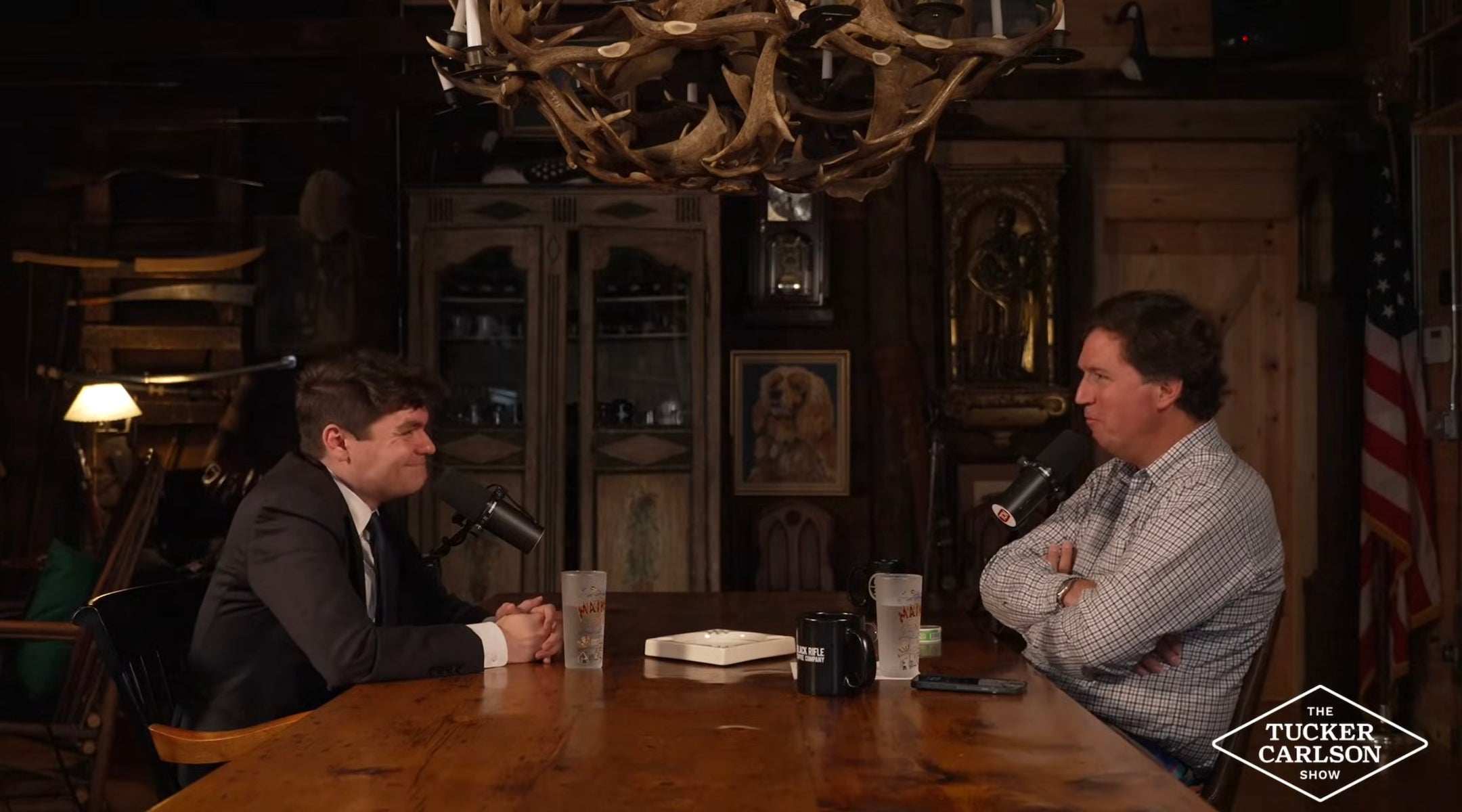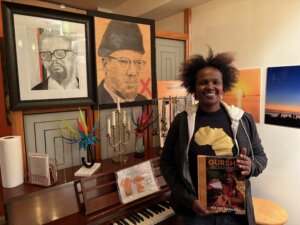Uncategorized
Tucker Carlson hosts Nick Fuentes for a friendly conversation about ‘these Zionist Jews’

Tucker Carlson wanted to know: What does Nick Fuentes actually believe?
“Everybody’s going to be like, ‘You’re a Nazi, you just like Fuentes,’” the former Fox News personality mused on his show Tuesday. “But then I’m like, ‘I don’t think Fuentes is going away. Ben Shapiro tried to strangle him in the crib in college, and now he’s bigger than ever.’”
So Carlson invited the avowed antisemite and white nationalist livestreamer onto his online talk show. There, the two had a friendly conversation about the Jews, and whether it was right to blame them for everything.
And Fuentes, whose own platform has only grown in the wake of the assassination of conservative archrival Charlie Kirk, made clear what he believes. Asked who in the conservative movement needed to be taken down, he responded, “These Zionist Jews.”
The sit-down, which had been rumored for weeks, carries implications for the growing popularity of antisemitism and anti-Israel voices on the right. Both men have followings in the millions, and Carlson has maintained close ties in President Donald Trump’s orbit even as he has become a vociferous critic of Israel and helped platform Holocaust revisionists.
Fuentes, meanwhile, has launched a far-right attack on mainstream conservatives using antisemitism as his chief plank — an ideology that an increasing number of young conservative operatives are also embracing. On YouTube, the top comments under the two-hour episode were rife with antisemitic memes.
Even as he signalled broad alignment with Fuentes’s views on Israel, Carlson gently sought to distinguish himself from his guest’s more overt antisemitism.
“I’m not that interested in ‘the Jews,’ but I am very interested in the foreign policy question,” Carlson said at one point, bringing up his fingers for air quotes. Later, he told Fuentes, “The second you’re like, ‘Well, actually, it’s the Jews,’ first of all, it’s against my Christian faith. Like, I just don’t believe that and I never will. Period. And second, then it becomes a way to discredit. That’s when I was like, ‘This guy’s a fed.’”
In response, the young man who opens his “America First” online shows with animated depictions of Jewish conspiracies outlined his own core belief: that “neoconservatism,” an ideology he opposes, is Jewish in nature because it prioritizes allegiance to Israel over traditional conservative principles.
“As far as the Jews are concerned, you cannot actually divorce Israel and the neocons and all those things that you talk about from Jewishness: ethnicity, religion, identity,” Fuentes told Carlson. While some Jews do oppose Israel, he acknowledged, among his enemies in conservatism, “I see Jewishness as the common denominator.”
Fuentes continued, “They’re a stateless people. They’re unassimilable. They resist assimilation for thousands of years. And I think that’s a good thing. And now they have this territory in Israel. There’s a deep religious affection for the state. It’s bound up in their identity.” Modern neoconservatism, he said, stemmed from “Jewish leftists who were mugged by reality when they saw the surprise attack in the Yom Kippur War.”
Fuentes insisted he doesn’t hate all Jews: “Not to be that guy and say that thing, but my best friend is a Jewish person,” he said, also claiming his “assistant” is Jewish (it was unclear if he was referring to the same person). He then went on to blend his understanding of Jewish American anxieties, some of which have been articulated by leading Jewish communal figures, with the dual-loyalty trope.
“If you are a Jewish person in America, it’s sort of rational self-interest, politically, to say, ‘I am a minority. I am a religious, ethnic minority. This is not really my home. My ancestral home is in Israel,’” Fuentes said. “They have this international community across borders, extremely organized, that is putting the interests of themselves before the interests of their home country.”
Even beyond Israel, Fuentes also sought to paint Judaism as incompatible with the European tradition to which America’s modern right aspires. “They hate the Romans because the Romans destroyed the Temple,” he said. “We don’t think that, as Americans and white people.”
To hear Fuentes tell it, his radicalization was a story of first being taken in by, before later rebelling against, influential Jewish conservatives. Israel was his breaking point, he insisted.
Ben Shapiro, Mark Levin and Dennis Prager were his right-wing heroes in high school, Fuentes said; he would parrot Shapiro talking points in debates and was a member of a Facebook group for young fans of PragerU. As a college freshman in 2017 he fell into the orbit of The Daily Wire, Shapiro’s media company, after a debate against his school’s progressive student body president went viral. Fuentes would soon drop out of college to pursue conservative media full-time.
Quickly, Fuentes claimed, he became suspicious of Shapiro’s pro-Israel views. When a staffer asked him if he had any interest in traveling to Israel, he responded, “No, I think I have everything I need right here in America…. And that was a little bit of foreshadowing.”
Later, he said, he would challenge Daily Wire staff: “I would say, ‘So, why do we give Israel all this money?’” he recalled. “They would say, ‘You’re asking it in an antisemitic way.’”
But Fuentes, in his recollection, “was genuinely inquisitive. I wanted to know. Is there an actual reason?… There’s a lot of these neocon Jewish types behind the Iraq War.” The Daily Wire’s rejection of his questions on Israel, he said, spurred his shunning across the broader mainstream conservative movement and led to him going independent with his preaching of more insidious forms of Jewish control.
Comparing himself to Shapiro, Fuentes reflected, “I didn’t come from some strange background. I come from a normal home. My parents are Catholic.” (In recent weeks, Shapiro and some other voices on the right have warned of a rise in antisemitic conspiracies among their ranks.)
Even as Fuentes became a Trump loyalist in the run-up to the 2016 election, he said, he broke with conservatives by supporting President Barack Obama’s decision to abstain from, rather than back, a National Security Council resolution condemning Israeli settlements in the West Bank.
“Fox News and all the pro-Israel conservatives are calling him an antisemite. They’re saying, ‘He hates Jews! He’s an antisemite! He hates Israel!’” Fuentes recalled. “It seemed hypocritical. It seemed like how, when conservatives would critique anything about race, we got called racist. Or anything about feminism, we got called sexist. All Obama did was uphold US policy on the West Bank that we’ve had since ’67, which is, we don’t support the settlements. I said, how is it antisemitic to just be consistent on our U.S. foreign policy?”
On Israel, Carlson said, they agreed.
“I always thought it’s great to criticize and question our relationship with Israel because it’s insane and it hurts us,” Carlson told him. “We get nothing out of it. I completely agree with you there.” He also blasted Christian Zionists on the right he used to support, including U.S. Ambassador to Israel Mike Huckabee, whom he said have been “seized by this brain virus.”
Later discussing the war in Gaza, Carlson added, “One of the reasons I’m mad about Gaza is because the Israeli position is, everyone who lives in Gaza is a terrorist because of how they were born, including the women and the children. That’s not a Western view. That’s an Eastern view. That’s non-Christian. That’s totally incompatible with Christianity and Western civilization. They say, ‘Oh, we’re the defenders of Western civilization.’ Not with that attitude, you’re not.”
The two did agree on some Jews they both respect, including Glenn Greenwald, an iconoclastic Israel critic formerly on the left who himself hosted Fuentes recently on his own podcast, and Paul the Apostle.
Elsewhere, the men discussed whom Fuentes wants to see be president next (he picked Ye, the superstar rapper who has embraced Nazism) and his 2022 dinner at Mar-a-Lago with Ye and Trump, where Fuentes said the once and future president said, “This guy’s hardcore. I like this guy.” (Trump has since claimed he didn’t know who Fuentes was when they dined together.)
When asked to share his unfettered core beliefs with Carlson, Fuentes obliged, painting a vision of a future America that Jews did not have the right to inherit.
“We do need to be right-wing. We do need to be Christian. We do, on some level, need to be pro-white,” he said. “Not to the exclusion of everybody else, but recognizing that white people have a special heritage here, as Americans.”
—
The post Tucker Carlson hosts Nick Fuentes for a friendly conversation about ‘these Zionist Jews’ appeared first on Jewish Telegraphic Agency.
Uncategorized
Ethiopian-American Jews lament loss of Harlem restaurant hub

For over a decade, Tsion Cafe, which owner Beejhy Barhany believes is the only Ethiopian Jewish restaurant in America, introduced patrons to injera, shakshuka spiced with berbere, and the flavors of Ethiopian-Jewish cuisine. But more than that, it introduced many patrons to Ethiopian Jews for the first time.
“I’ve been the ambassador, willingly or unwillingly,” Barhany said. “On the forefront, bringing and pushing for Jewish diversity.”
She recalled a moment that, for her, encapsulates the spirit of Tsion Cafe: feeding gursha — the Ethiopian tradition of placing food directly into someone’s mouth as a gesture of love — to an elderly Ashkenazi Jewish woman.
“She was open to receiving it! Someone who would never eat with their fingers,” Barhany said, laughing. “And she couldn’t stop.”
For Ethiopian Jews in America, a community numbering only a few hundred, Tsion Cafe was one of the only public-facing outposts of their heritage. But earlier this month, Barhany, who has been serving up Ethiopian Jewish delicacies to the Harlem community since 2014, announced on Instagram that she would close the restaurant’s dining room for “security reasons,” a move first reported by the New York Jewish Week.
Barhany told the Forward she has received “a lot of hate, phone calls, harassment,” including someone scrawling a swastika on the front of the restaurant. “You kind of push it aside, you disregard it. But at the end of the day, there is an impact emotionally, and it becomes a burden. I said to myself, ‘You know what? It’s just not worth it. It’s too much to deal with.’”
Despite the closure, Barhany remains determined to continue to share Ethiopian Jewish culture with patrons through catering and private events. “We are pivoting for security reasons because we have been threatened,” she said. “It’s not gone. We are reinventing ourselves. We are not giving up.”
The ‘October 8th Impact’
Barhany was born in Ethiopia and spent three years in a Sudanese refugee camp before moving to Israel in 1983, where she later served in the Israeli Defense Forces — a path shared by many Ethiopian Jews of her generation.
Ethiopian Jews lived for centuries in Ethiopia, maintaining ancient Jewish traditions and largely isolated from the broader Jewish world. In the 1980s and early 1990s, amid widespread instability in Ethiopia, Israel carried out dramatic covert airlift operations which brought tens of thousands of Ethiopian Jews to Israel. For many, their connection to Israel is rooted not only in longstanding religious tradition, but also in the lived experience of those rescue missions.
“Ethiopian Jews are very loyal to Jerusalem and to the people of Israel,” said Dr. Ephraim Isaac, an Ethiopian Jewish scholar based in New Jersey. “All the Ethiopian Jews I know living in America have relatives in Israel, and they go back and forth.”
When she arrived in New York in the early 2000s, Barhany was struck by how little awareness Americans had of the African Jewish diaspora. Wanting to educate her new neighbors about her background, and searching for a sense of “community and belonging,” she opened Tsion Cafe in 2014.
After the violent attacks on Israelis on October 7, 2023, Barhany said she felt the desire to be more public about her Judaism and her connection to Israel. “It was that October 8th impact. You just wanted to be a proud Jew,” she said. That impulse pushed her to make Tsion Cafe fully kosher and vegan. “I thought, ‘How can I have my people come here and feel comfortable?’ And also introduce Ethiopian food to people who never had it before.”

She also became more outspoken about her Jewish heritage and her connection to Israel, appearing in cooking videos with popular pro-Israel influencer Noa Tishby, and posting photos of herself at a pro-Israel rally shortly after the October 7 attacks. As pro-Palestinian protests unfolded across New York City, particularly on nearby college campuses like Columbia University, she said she understood that her outspokenness could make her a target.
But for Barhany, there was no other option. “I celebrated proudly and amplify my identity. I never shy away from that,” she said. “Otherwise I wouldn’t be true to myself.” She says her advocacy “happened organically, sincerely, genuinely, because who I am.” “I didn’t sign up for this,” she said, laughing. “But I am happy to engage with those people and maybe broaden their understanding of Jewish Diaspora.”
A small community, a singular space
For many in the United States’ small Ethiopian Jewish community, Tsion Cafe’s closure represents more than a business shift; it marks the disappearance of one of the only visible spaces representing their culture in America.
Isaac estimates the Ethiopian Jewish population in America numbers only a few hundred.“They came here just like other members of Israeli society,” he said, for education, work, or opportunity. Some say they came to the U.S. to get away from discrimination they experienced in Israel. The largest cluster, he noted, is in Jersey City, with smaller communities in Brooklyn and Queens. “We respect each other, we love each other, but never lost contact,” he said.
Barhany said that for many in the American Ethiopian Jewish community, Tsion Cafe was seen as “a home far away from home” with community members traveling from across the country to come to her restaurant. “We have people coming from D.C., L.A., you name it,” she said.
“I think a majority of Ethiopian Jews in America know Beejhy,” Isaac remarked. “The community is very upset by the closure. She is respected for all the efforts that she has undertaken.”
Tali Aynalem, a 34-year-old Ethiopian Jew who lives in Oregon, said Tsion Cafe challenged longstanding assumptions about what Jewish identity looks like in the U.S.. “In America, there is an idea of one way that a Jewish person looks like. I always sort of have to explain who I am. It’s not just understood.”
For Aynalem, Tsion Cafe was bringing to light the diversity of Jews and Israelis to an American audience. “She really was showing what Israel is all about, which is that we are so mixed because we’ve all been in exile in so many different places for so long. She showed that in her restaurant.”
But Aynalem sees the restaurant’s closure as part of a broader trend.“People are quick to say, ‘It’s a Black-owned business, it’s a small business, support it.’ But as long as there’s an intersection with Judaism, there’s no support,” she said. “It raises the question: do you care about Black people, or do you just not care about Jews, regardless of color?”
She added that, as an Ethiopian Jewish woman, she once believed her racial identity shielded her from certain forms of antisemitism.
“For a long time, I felt like that extra layer of being Black almost protected me, because people are scared of being called racist,” she said. “They’re not scared of being called antisemitic.”
In the wake of rising threats and Tsion Cafe’s closure, she said, that sense of insulation has faded.
“It shows you that antisemitism, regardless of what you look like, doesn’t really discriminate,” she said. “I don’t think I have that extra armor anymore. No one is really safe in this climate.”
Aynalem also worries that Ethiopian Jews in America are still understood primarily through the lens of rescue. She said that for many American Jews, the only thing they know about Ethiopian Jews is stories of the dramatic operations that brought them to Israel.
“We’re past that,” she said. “Let’s talk about my generation. We’re part of the culture. People are eating injera, that’s a normal occurrence within Israeli culture now.” For Tali, Tsion Cafe was doing exactly that.
Barhany agrees.
“I always see articles about Ethiopian Jews being rescued,” she said. “I’m kind of fed up with that.” For her, Tsion Cafe was a way to “bring something more positive and more unifying” to the American conversation about Ethiopian Jewish life.
Not just for Ethiopian Jews
Rabbi Mira Rivera of JCC Harlem said Tsion Cafe was woven into the fabric of Jewish life in the neighborhood. “The Ethiopian Jews in Harlem aren’t going anywhere,” she said. “But it was always a joy to have a bastion, a place where you’d say, ‘Let’s meet at Tsion Cafe. Let’s celebrate your birthday there.’ It was part of living in Harlem.”

She compared Tsion Cafe to the Ethiopian Jewish neighborhoods she had visited in Israel, places where a community had a visible center. “This was that place,” she said. “It was where people gathered. Over the years, they changed to vegan and kosher so that the larger Jewish community would start to understand and partake in their culture.” She continued, “to not have that place where all the families can go, it’s really hard.”
But for Barhany, Tsion Cafe was never meant to be “just a cafe.” “I didn’t want it to be a regular cafe where you go in, sit, pay, and go,” she said. “It’s a place where people can nourish and engage in grown-up conversation.”
Amid antisemitic threats, she remains more committed to that mission than ever. Barhany plans to host interfaith gatherings and travel the country to share the flavors and stories of Ethiopian Jewish culture.
“If I can facilitate dialogue, I would be honored,” she said.
“We are not giving up. We are still here. We’re just coming in a different shape or form.”
The post Ethiopian-American Jews lament loss of Harlem restaurant hub appeared first on The Forward.
Uncategorized
Tucker’s Ideas About Jews Come from Darkest Corners of the Internet, Says Huckabee After Combative Interview

US Ambassador to Israel Mike Huckabee looks on during the day he visits the Western Wall, Judaism’s holiest prayer site, in Jerusalem’s Old City, April 18, 2025. Photo: REUTERS/Ronen Zvulun
i24 News – In a combative interview with US Ambassador to Israel Mike Huckabee, right-wing firebrand Tucker Carlson made a host of contentious and often demonstrably false claims that quickly went viral online. Huckabee, who repeatedly challenged the former Fox News star during the interview, subsequently made a long post on X, identifying a pattern of bad-faith arguments, distortions and conspiracies in Carlson’s rhetorical style.
Huckabee pointed out his words were not accorded by Carlson the same degree of attention and curiosity the anchor evinced toward such unsavory characters as “the little Nazi sympathizer Nick Fuentes or the guy who thought Hitler was the good guy and Churchill the bad guy.”
“What I wasn’t anticipating was a lengthy series of questions where he seemed to be insinuating that the Jews of today aren’t really same people as the Jews of the Bible,” Huckabee wrote, adding that Tucker’s obsession with conspiracies regarding the provenance of Ashkenazi Jews obscured the fact that most Israeli Jews were refugees from the Arab and Muslim world.
The idea that Ashkenazi Jews are an Asiatic tribe who invented a false ancestry “gained traction in the 80’s and 90’s with David Duke and other Klansmen and neo-Nazis,” Huckabee wrote. “It has really caught fire in recent years on the Internet and social media, mostly from some of the most overt antisemites and Jew haters you can find.”
Carlson branded Israel “probably the most violent country on earth” and cited the false claim that Israel President Isaac Herzog had visited the infamous island of the late, disgraced sex offender Jeffrey Epstein.
“The current president of Israel, whom I know you know, apparently was at ‘pedo island.’ That’s what it says,” Carlson said, citing a debunked claim made by The Times reporter Gabrielle Weiniger. “Still-living, high-level Israeli officials are directly implicated in Epstein’s life, if not his crimes, so I think you’d be following this.”
Another misleading claim made by Carlson was that there were more Christians in Qatar than in Israel.
Uncategorized
Pezeshkian Says Iran Will Not Bow to Pressure Amid US Nuclear Talks

Iranian President Masoud Pezeshkian attends the Shanghai Cooperation Organisation (SCO) Summit 2025, in Tianjin, China, September 1, 2025. Iran’s Presidential website/WANA (West Asia News Agency)/Handout via REUTERS
Iranian President Masoud Pezeshkian said on Saturday that his country would not bow its head to pressure from world powers amid nuclear talks with the United States.
“World powers are lining up to force us to bow our heads… but we will not bow our heads despite all the problems that they are creating for us,” Pezeshkian said in a speech carried live by state TV.


